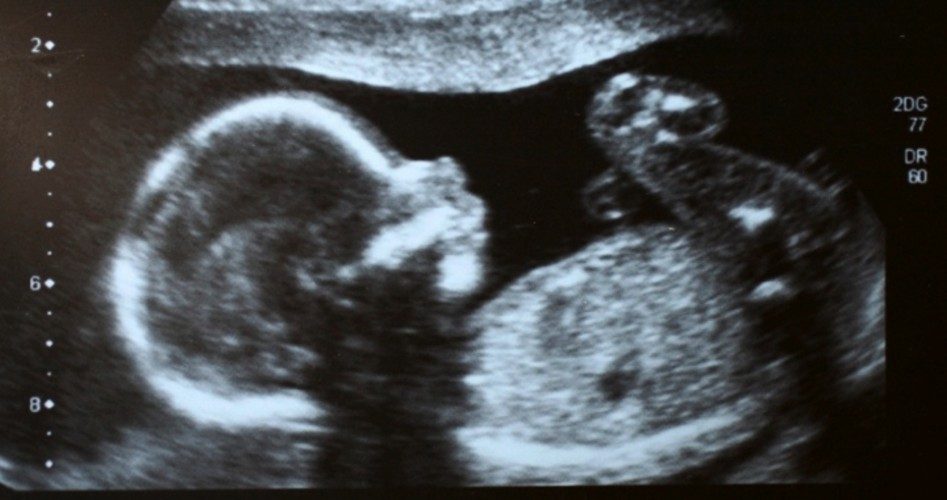
North Dakota Governor Jack Dalrymple has signed into law the latest in a series of abortion restrictions passed by the state’s legislature. On Tuesday,the Republican governor signed the”fetal pain” bill, outlawing abortion after 20 weeks, the point at which proponents of the bill say a human fetus feels pain. Opponents argue that premise is unproven.
The bill passed the House last Friday by a 60-32 vote, after winning a 30-17 approval in the Senate in February. It is the fourth in a series of measures passed in Bismarck this session in an ongoing challenge to the U.S. Supreme Court’s Roe v. Wade ruling of 1973, proclaiming abortion as a constitutional right and forbidding states from interfering with a woman’s decision to terminate her pregnancy before viability, which the Court pegged at 24 weeks of gestation. Abortions may be performed at any time beyond that point, the Court held, when a woman’s physical or psychological health or safety is endangered by the pregnancy.
The North Dakota legislators and governor have also passed and signed into law a bill that bans abortion after a fetal heartbeat can be detected, as early as the sixth week of pregnancy.They have also enacted a law banning abortions based on the discovery of fetal defects, such as Down syndrome, and a requirement that anyone performing abortions must be a licensed physician with hospital-admitting privileges.The measures take effect August 1. Abortion-rights advocates have called the laws unconstitutional and have expressed confidence they will win the legal battles they plan to wage against them.
Opponents claim that in addition to making a legal challenge to the Roe ruling, Dalrymple and his allies in the legislature are hoping the new restrictions will impede or possibly force the closing of the state’s only abortion facility, the Red River Women’s Clinic in Fargo. The Center for Reproductive Rights has said it is committed to challenging the fetal heartbeat bill on behalf of the clinic, the Associated Press reported. The New York-based group is representing the clinic for free in a trial that started Tuesday over a 2011 law banning the use of a medication that induces abortion. A judge has temporarily blocked enforcement of that law.
Rep. Gail Mooney (D-Cummings) challenged the overlapping and redundant features of the restrictions while opposing the fetal pain bill in the House of Representatives last week.”The question needs to be asked: How many more do we need?” she said. Sen. Joe Miller, a Republican from Park River and the primary sponsor of the bill, said it presents “a different precedent and a different strategy.”
“The fetal heartbeat bill is what it is and this is what it is,” said Miller. “We all came forward with different ideas.”
At least 10 states have passed bills banning abortions after 20 weeks of pregnancy on the premise that a fetus can feel pain at that stage, the AP reported. North Dakota Rep. Kylie Oversen (D-Grand Forks) said that premise is disputed among scientists,and argued the 20-week limit gives doctors performing abortions a standard impossible to follow.
“A doctor cannot definitively determine post-fertilization age,” she said. “So we’re basing this on a guess.”
According to Time magazine, North Dakota law also requires a 24-hour waiting period between the scheduling and performance of an abortion, a counseling, testing and verification process that can last up to five hours, and parental notification for a minor seeking abortion. In 2011, Time reported, a record 92 abortion-regulating provisions were passed in 24 states after Republicans in the 2010 elections gained new and larger majorities in several state legislatures. North Dakota is one of four states — along with South Dakota, Mississippi, and Arkansas — to have only one surgical abortion clinic in operation, Time reported in January. Well before the recent spate of restrictions, the number of abortion providers nationwide shrank from 2,908 in 1982 to 1,793 in 2008, the last year for which the data is available, the magazine reported.
In a fundraising e-mail sent last week, Marjorie Dannenfelser, president of the pro-life Susan B. Anthony List, claimed the nation has reached a “tipping point for Life” with the publication in The Atlantic magazine of a detailed account of the abortion practice of Dr. Kermit Gosnell, the Philadelphia physician now on trial on a number of charges, including eight counts of homicide regarding one patient who died from an abortion and seven infants Gosnell allegedly killed after they were born alive. The Atlantic article, titled “Why D. Kermit Gosnell’s Trial Should Be a Front-Page Story,” is in notable contrast to the lack of coverage in most of the national media. The story is accompanied by a picture of an aborted infant, something rarely seen other than in pro-life journals and mailings.
“The fact that a magazine like The Atlantic is publishing a picture like you see above is a breakthrough moment,” wrote Dannenfelser, who sees the accounts of Gosnell’s practice, including the extremely unsafe and unsanitary practices reported at his clinic, as ammunition to be used in a continuing battle for regulations governing conditions and practices at abortion facilities.
“We must hammer politicians who oppose clinic regulations and stand up for those who are getting them passed,” she wrote. “This is already becoming an issue in some 2013 state races, and we must make it an issue in 2014 Senate races which are starting to heat up.”


